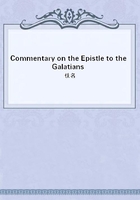
第63章
Sarah's demand that the bondwoman and her son be cast out of the house was undoubtedly a blow to Abraham. He felt sorry for his son Ishmael. The Scripture explicitly states Abraham's grief in the words: "And the thing was very grievous in Abraham's sight, because of his son." (Gen. 21:11.) But God approved Sarah's action and said to Abraham: "Let it not be grievous in thy sight because of the lad, and because of thy bondwoman; in all that Sarah hath said unto thee, hearken unto her voice; for in Isaac shall thy seed be called." (Gen. 21:12.)
The Holy Ghost contemptuously calls the admirers of the Law the children of the bondwoman. "If you do not know your mother, I will tell you what kind of a woman she is. She is a slave. And you are slaves. You are slaves of the Law and therefore slaves of sin, death, and everlasting damnation.
You are not fit to be heirs. You are put out of the house."
This is the sentence which God pronounces upon the Ishmaelites, the papists, and all others who trust in their own merits, and persecute the Church of Christ. Because they are slaves and persecutors of the children of the free woman, they shall be cast out of the house of God forever. They shall have no inheritance with the children of the promise. This sentence stands forever.
This sentence affects not only those popes, cardinals bishops, and monks who were notoriously wicked and made their bellies their Gods. It strikes, also, those who lived in all sincerity to please God and to merit the forgiveness of their sins through a life of self-denial. Even these will be cast out, because they are children of the bondwoman.
Our opponents do not defend their own moral delinquency. The better ones deplore and abhor it. But they defend and uphold their doctrine of works which is of the devil. Our quarrel is not with those who live in manifest sins. Our quarrel is with those among them who think they live like angels, claiming that they do not only perform the Ten Commandments of God, but also the sayings of Christ, and many good works that God does not expect of them. We quarrel with them because they refuse to have Jesus' merit count alone for righteousness.
St. Bernard was one of the best of the medieval saints. He lived a chaste and holy life. But when it came to dying he did not trust in his chaste life for salvation. He prayed: "I have lived a wicked life. But Thou, Lord Jesus, hast a heaven to give unto me. First, because Thou art the Son of God.
Secondly, because Thou hast purchased heaven for me by Thy suffering and death. Thou givest heaven to me, not because I earned it, but because Thou hast earned it for me." If any of the Romanists are saved it is because they forget their good deeds and merits and feel like Paul: "Not having mine own righteousness which is of the law, but that which is through the faith of Christ." (Phil. 3:9.)
VERSE 31. So then, brethren, we are not children of the bondwoman, but of the free.
With this sentence the Apostle Paul concludes his allegory of the barren Church. This sentence forms a clear rejection of the righteousness of the Law and a confirmation of the doctrine of justification. In the next chapter Paul lays special stress upon the freedom which the children of the free woman enjoy. He treats of Christian liberty, the knowledge of which is very necessary. The liberty which Christ purchased for us is a bulwark to us in our battle against spiritual tyranny. Therefore we must carefully study this doctrine of Christian liberty, not only for the confirmation of the doctrine of justification, but also for the comfort and encouragement of those who are weak in faith.